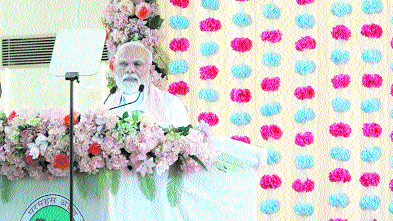Govt welfare schemes reflect Advaita’s ‘Spirit of Service’: PM Modi
| Date :12-Apr-2025 |

Senior Special
Correspondent
Underlining the Advaita’s teachings of ‘principle of service’ and how its elements have been included in to the various welfare initiatives taken by his Government, Prime Minister Narendra Modi said that the Pradhan Mantri Garib Kalyan Anna Yojana, which ensures that no poor individual goes hungry, and the Pradhan Mantri Ayushman Yojana, which has alleviated the burden of medical expenses for underprivileged communities. the PM Awas Yojana, which guarantees secure, permanent housing for many, and the Jal Jeevan Mission Yojana, which has brought clean water solutions to villages across the nation, are some of the programmes government is running. He was addressing a gathering at Anandpur Dham in Isagarh, Ashoknagar on Friday. Earlier, Prime Minister Modi offered his reverences to the Guruji Adwait Anand Parmanand Dayalji Maharaj (first Padshahi) and all six Gurus. He also offered flowers to the Anandpur Sarovar.
In educational and healthcare infrastructure, New AIIMS, IITs, and IIMs are being established, enabling even the underprivileged children to fulfill their dreams and poor to get quality treatment. “Whenever India faced a difficult phase, a ‘Rishi Muni’ has descended on earth and given a new direction to India.” Hailing the
Anandpur Trust for its charitable services, the Prime Minister mentioned that this spirit of service aligns seamlessly with the ethos of government programs. Highlighting his recent discussion with Sixth Padshahi Vicharpurna Anandji Maharaj of the Advaita sect at Anandpur Dham, the PM Modi emphasised the Government’s firm dedication to comprehensive development, describing it as a testament to the nation’s collective spirit of service. In addition to addressing social and educational needs, he highlighted the Government’s commitment to environmental conservation.
He appreciated the Mother Tree campaign, under which millions of trees have been planted across the country, highlighting a dedication to protecting and nurturing nature for future generations. At the core of this mission, the Prime Minister explained, lies the principle of ensuring progress for all.
This philosophy fosters resilience and unity among citizens through acts of service, a value deeply rooted in the teachings of Advaita. Such acts, he remarked, enrich not only society but also individual character. PM Modi spoke about the work is being carried out by devotees at Anandpur Dham rendering selfless service through initiatives such as free medical camps, modern cowsheds, and in education. “These efforts not only uplift humanity but also champion environmental conservation. Rooted in the ethos of service, these initiatives drive national development while strengthening individual capacity to overcome challenges,” he said.
The Government’s commitment reflects its objective to uplift communities and safeguard the environment as well, keeping a constant and inclusive journey of progress. Pointing out the importance of Advaita’s philosophy, which advocates unity and harmony by recognising the divine essence in all beings, the Prime Minister emphasised how this perspective dissolves barriers between individuals, fostering a collective spirit of service and inclusivity.
He also drew attention to cultural preservation efforts, including granting the GI tag to Chanderi sarees, establishing a handloom tourism village in Pranpur, and preparation for the upcoming Ujjain Simhastha. PM Modi said here, the Government is also developing Ram Van Gaman Path, which would add another ‘Unique’ identity to state as a large stretch of the ‘Path’ will pass through the state.
These initiatives, he remarked, exemplify the balance between heritage conservation and progress and a gesture from the government to return something to society. Signing off his address, he pledged the importance of safeguarding India’s cultural and spiritual identity amidst its developmental journey. He said that Anandpur Sahib Dham would continue to play a key role in advancing the vision of a developed and inclusive India.
